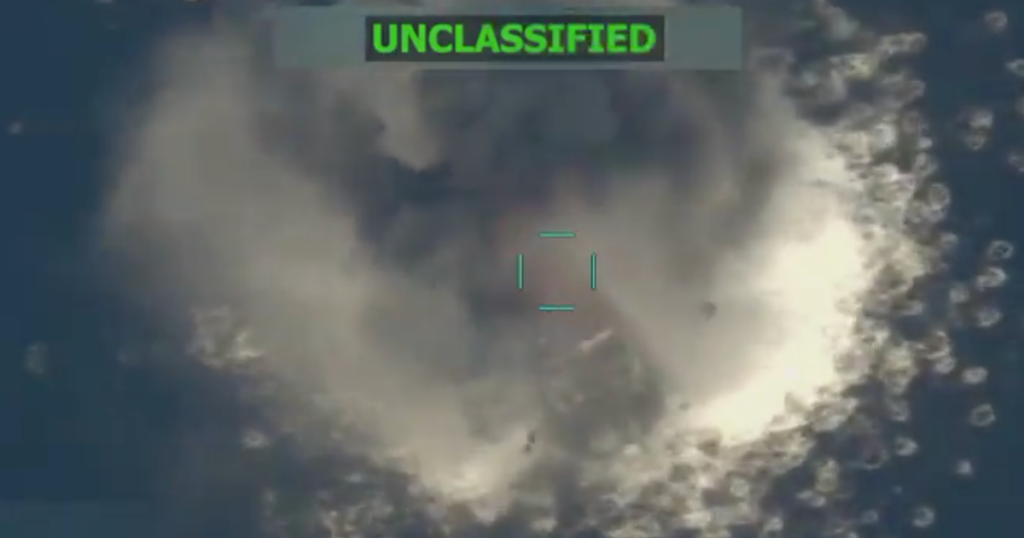The U.S. military has intensified its operations against suspected drug trafficking vessels in the Pacific Ocean, marking at least the 15th successful strike in an ongoing campaign. Initiated under the Trump administration, these strikes have reportedly resulted in over 60 fatalities as the U.S. bolsters its efforts against narco-terrorism linked to organized crime. Defense Secretary Pete Hegseth announced the most recent operation, asserting that the military will maintain its aggressive stance in combating drug cartels and their operations.
| Article Subheadings |
|---|
| 1) Overview of Recent Military Strikes |
| 2) Operations Expansion and Alleged Threats |
| 3) Diplomatic Reactions and Controversies |
| 4) The Legal Authority for Military Actions |
| 5) Future Implications and Military Strategy |
Overview of Recent Military Strikes
The latest military strike occurred on a Wednesday in the Pacific Ocean, targeting an alleged “narco-trafficking vessel.” According to Defense Secretary Hegseth, this operation resulted in the deaths of four individuals onboard, further escalating a campaign that has already seen numerous similar actions in the past two months. The strikes aim to dismantle the networks behind drug trafficking that threaten U.S. domestic safety.
Officials claim that this strike marks at least the 15th operation targeting these vessels. The heightened military presence in these waters reflects a commitment to counteract drug-related threats that pose a risk to communities in the United States. These measures underscore the administration’s insistence that drug trafficking is not merely a border issue but one necessitating decisive military intervention.
Operations Expansion and Alleged Threats
The military operations targeting alleged drug vessels began earlier last month in the Caribbean, with activities now extending into the Eastern Pacific. Secretary Hegseth stated that some of these vessels are purportedly linked to the Venezuelan gang, Tren de Aragua, although this connection has not been confirmed in every incident. The U.S. government has reiterated its commitment to monitor maritime activities in these regions, suggesting that the threat level justifies ongoing military responses.
The administration describes its confrontation with drug cartels as an “armed conflict”, leveraging the classification to justify military action. This assertion lays the groundwork for continued strikes, as officials argue that the narco-traffickers pose a direct threat not only to U.S. interests but also to democratic stability in the region.
“The Western Hemisphere is no longer a safe haven for narco-terrorists bringing drugs to our shores to poison Americans,”
stated Hegseth.
Diplomatic Reactions and Controversies
The ongoing military campaign has met with significant pushback from various lawmakers. Critics are calling for more substantial evidence that the targets truly represent a direct threat or are actively involved in smuggling activities. Concerns have also been raised about the potential for these actions to escalate into broader conflicts within Latin America.
Radio broadcasts from Venezuela and Colombia illustrate the growing tension as both nations have expressed outrage over the U.S. military’s strikes. Venezuelan President Nicolás Maduro has openly rebuked the accusations, denying any partnership with criminals or terrorist organizations. The situation is further complicated by the presence of U.S. warships in the region, which some perceive as provocative military posturing.
The Legal Authority for Military Actions
Despite the criticisms, the Trump administration maintains that it possesses the legal authority to conduct these strikes without congressional approval. As military operations broaden in scope and scale, the lack of explicit legislative authorization poses challenges to governance and raises ethical questions regarding U.S. military engagement abroad.
As the controversy unfolds, some lawmakers are pushing for a formal debate regarding the extent and impact of these military actions in Latin America. The absence of a clear legislative framework exacerbates the complexities surrounding military interventions, especially those not sanctioned explicitly by Congress.
Future Implications and Military Strategy
Looking forward, the administration appears poised to expand its military strategies, with Trump hinting at the prospect of strikes against land-based targets. “The land is going to be next,” he stated last week, indicating potential escalations in military involvement that could have significant implications for the region.
The continued military presence in both maritime and land domains may potentially lead to more extensive confrontations. Furthermore, these strategies could reshape the international relations landscape in the Western Hemisphere, prompting neighboring countries to reassess their approach to drug trafficking and security cooperation with the U.S.
| No. | Key Points |
|---|---|
| 1 | The U.S. military has conducted multiple strikes against alleged drug trafficking vessels, resulting in substantial casualties. |
| 2 | The campaign is part of a broader strategy to combat narco-terrorism affecting U.S. interests. |
| 3 | Legal authority for these actions is contested, with some lawmakers demanding more oversight and evidence of threats. |
| 4 | Neighboring countries like Venezuela and Colombia have voiced strong opposition to U.S. military interventions. |
| 5 | There are indications of potential escalation as military strategies expand toward land-based interventions. |
Summary
The unfolding events in the Pacific Ocean reflect a complex interplay of military strategy, international law, and diplomatic relations. As the U.S. ramps up its efforts against drug trafficking, the consequences of such military actions remain uncertain. Ongoing debates in Congress and reactions from foreign governments will likely influence the trajectory of U.S. involvement in Latin America in the coming months.
Frequently Asked Questions
Question: What is the main goal of the U.S. military strikes?
The primary goal is to combat narco-terrorism associated with drug cartels that threaten U.S. safety and stability.
Question: How is the U.S. justifying these military actions?
The U.S. argues that it is engaged in an “armed conflict” with specified terrorist organizations, providing the basis for military intervention.
Question: What has been the response from impacted countries?
Countries like Venezuela and Colombia have expressed outrage, accusing the U.S. of breaching sovereignty and escalating tensions in the region.


